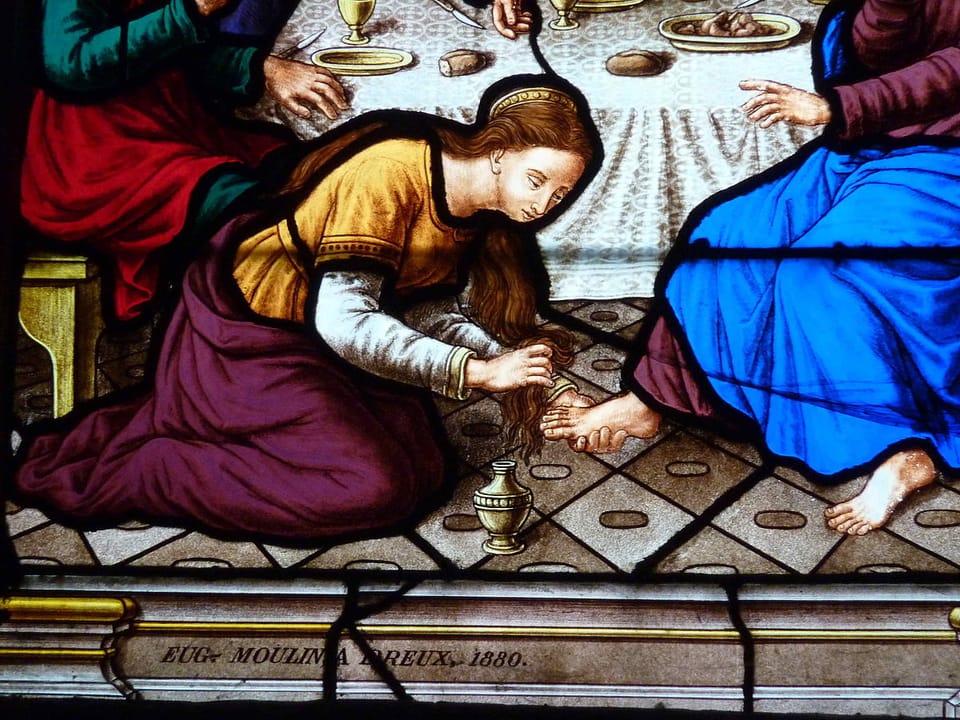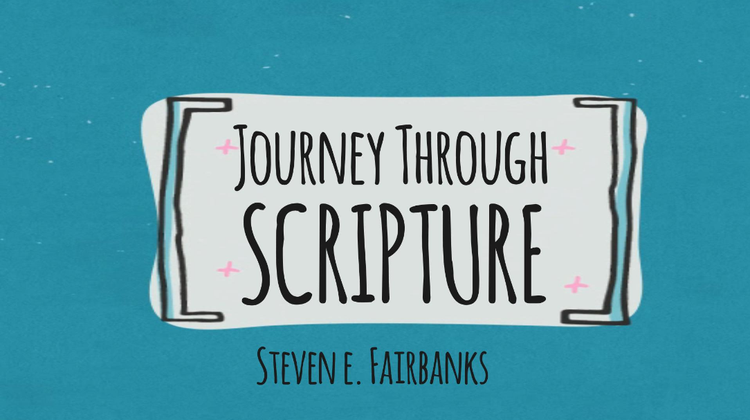It's Spy Wednesday

However, in order to not clog up your inbox, you will only receive an email on Thursday, and Easter Sunday.
Read "It's Palm Sunday"
Read "It's Holy Monday"
Read "It's Holy Tuesday"
On Holy Wednesday, sometimes known as Spy Wednesday (referring to Judas’ meeting with the chief priest, at which time he agreed to turn over Jesus to them for thirty pieces of silver), Christians commemorate several significant events in the life of Jesus. Of particular importance are the anointing and betrayal of Jesus.
An unnamed woman anoints Jesus at Bethany
6 When Jesus was at Bethany visiting the house of Simon, who had a skin disease, 7 a woman came to him with a vase made of alabaster containing very expensive perfume. She poured it on Jesus’ head while he was sitting at dinner. 8 Now when the disciples saw it they were angry and said, “Why this waste? 9 This perfume could have been sold for a lot of money and given to the poor.”
10 But Jesus knew what they were thinking. He said, “Why do you make trouble for the woman? She’s done a good thing for me. 11 You always have the poor with you, but you won’t always have me. 12 By pouring this perfume over my body she’s prepared me to be buried. 13 I tell you the truth that wherever in the whole world this good news is announced, what she’s done will also be told in memory of her.” (Matthew 26:6-13)
It was customary, given the culture, to anoint the heads of important guests. The head…not feet. This was somewhat unusual, and the perfume was expensive. Some believe it could have been worth up to a year of a common laborer’s wage. Once the alabaster container was broken, the fragrance would quickly diminish…and its value promptly lost.
This unnamed woman gives up her most valuable possession (probably) for the sake of Jesus. For her, Jesus was worthy of this expensive outpouring of this valuable resource. She willingly lowered herself, poured it out, and surrendered herself to anoint the Messiah King.
The disciples, those men closest to Jesus, seem to believe that the woman’s value assessment is misguided—she is wasting a valuable resource that could have been used in other, more meaningful ways. Whether the woman knew or understood everything about what her actions meant can be debated, but the disciples are not seeing the theological importance of what is happening around them.
And Judas, as we will see later, also assigned Jesus a value—30 pieces of silver. There has been much debate about Judas’ motives for agreeing to this exchange. Whether his intent was evil or merely misguided, we cannot know.
Regardless, Jesus corrects his disciples who balked at the pouring of valuable perfume on Jesus’ feet by alluding to Deuteronomy 15:11—
11 Poor persons will never disappear from the earth. That’s why I’m giving you this command: you must open your hand generously to your fellow Israelites, to the needy among you, and to the poor who live with you in your land. (CEB)
Jesus is not discounting the plight of the poor or downplaying the importance of providing for them. However, at that time and place in history—at the moment in question, that Wednesday of the original Holy Week—devotion to Jesus comes before all other agendas.
What is happening here will change the entire trajectory of human history.
Each of us must decide what place and value Jesus will hold in our lives. And it’s the unnamed woman in Matthew's gospel, rather than his closest disciples, who provide the example of full surrender…a complete pouring out of oneself for the sake of Christ.
- What value do I place on Jesus?
- Am I willing to pour out at his feet what is most valuable to me?
Judas betrays Jesus
For money Judas Iscariot sold Christ, and was ruined eternally.
—J.C. Ryle, Practical Religion—
At some point following this anointing by the woman, Judas Iscariot went to the chief priests and said to them…
…”What will you give me if I turn Jesus over to you?” They paid him thirty pieces of silver. 16 From that time on he was looking for an opportunity to turn him in. (Matthew 26:15-16)
“Judas heard all of Christ’s sermons,” wrote Thomas Goodwin, yet he decided to betray his friend and rabbi.
Why?
Was Judas predestined for this deed?
Did Judas make this decision out of his own free will?
These questions have been debated throughout the entirety of church history. As I have reflected on this, two thoughts regularly come to mind—
If God had prevented the existence of those who, though created by His goodness, would by their own choice become evil, then evil would show itself more powerful than God’s goodness. So, all things which God makes He makes good, but each one becomes good or evil by his own choice. So, even if the Lord did say: 'It were better for him if that man had not been born,' He did not say so in deprecation of the person he created but in deprecation of that person’s choice and rashness.
― John of Damascus (paraphrased slightly to aid clarity)
Genesis reminds us that God’s creation is good, including humanity. The original sin that mars the image of God in us was not part of God’s original good creation. The human being, created in the image of God, is good.
Yes, we have a bent toward sinning—original sin—that comes to us through our first parents in the Garden of Eden. We find ourselves broken, selfish, and in need of rescue. Evil, however, is not more powerful than God’s goodness. By God’s grace, we are given the opportunity and ability to choose good over evil, right over wrong, and light over darkness.
Judas, like us all, was a man in need of a Savior. He could not see the Savior with whom he was walking, just as we sometimes cannot see our own need.
And finally, a word from Pope John Paul I, echoing a curious thought I’ve been pondering for years—
Judas made a huge blunder the day in which he sold Christ for 30 denarii, but he made an even bigger one when he thought that his sin was too great to be forgiven. No sin is too big: any wretchedness, however great, can always be enclosed in infinite mercy.
—Pope John Paul I
The temptation to ask the question, “What will you give me in return for Jesus,” is great. Fame? Fortune? Pleasure? Something else?
What, if anything, are we willing to trade? Our answer to that question indicates where we most need to surrender.
And even if we have, at some point, traded Jesus for our thirty pieces of silver, forgiveness is still on the table. No sin is too great, no wretchedness too heavy, that it cannot be overcome with our heavenly Father's overwhelming and infinite mercy.
Would you do me a favor?
If you are reading this online, please scroll down to the bottom of this email and leave a comment under "Member Discussions."
NOTE: If this is your first time to leave a comment, you may need to sign in first. Just enter your email and then check your email for a personalized link. You should only have to do this once (unless you log back out when you're done).





Member discussion